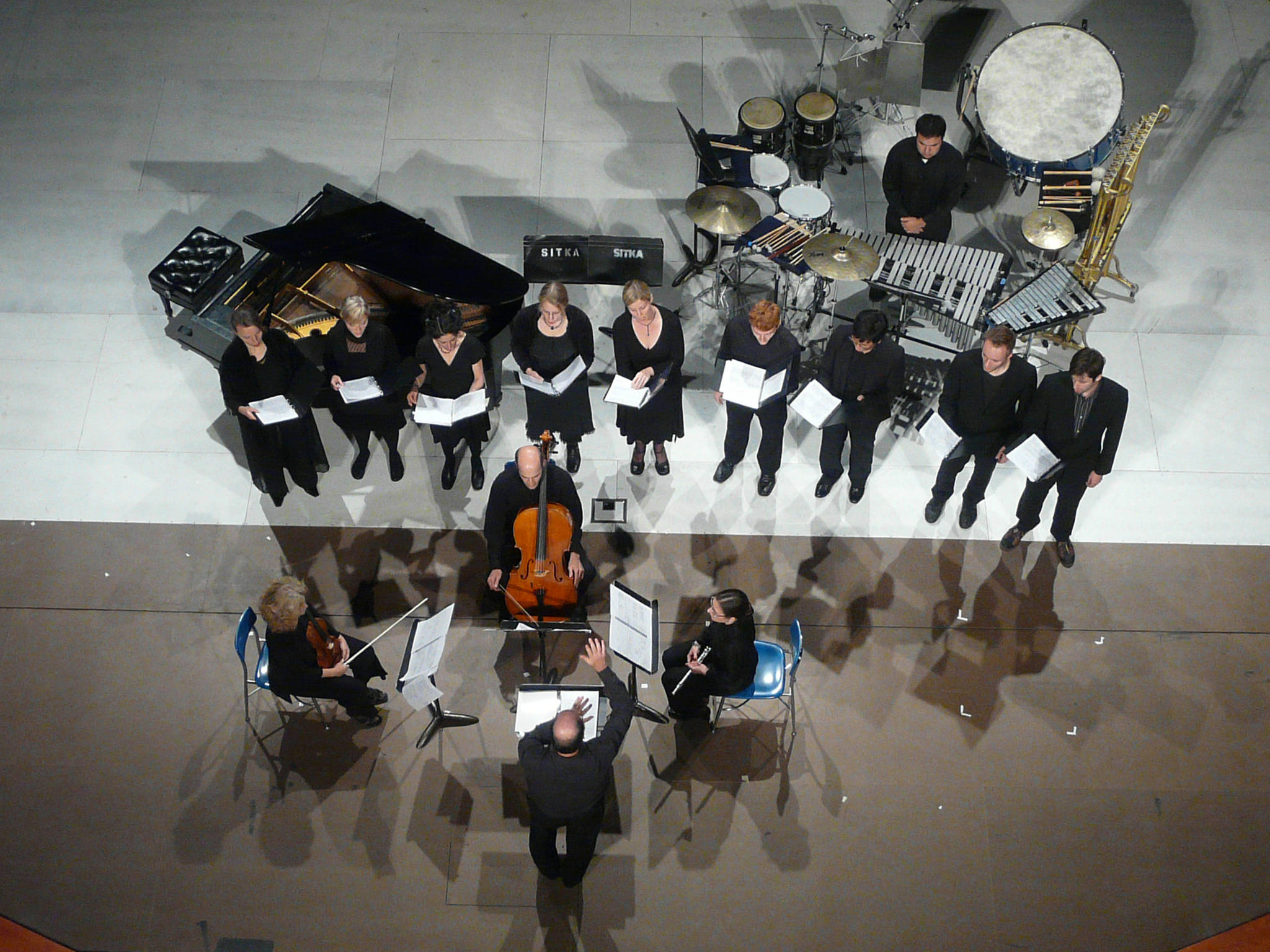How do you define “music?”
That’s something Ed Littlefield thought about for six months as part of an undergraduate class, it’s something he’s been thinking about since, and it’s a question he posed to the attendees at an April 21 “Art of Place” lecture on “Tlingit Music — Past, Present and Future.”
Littlefield, who grew up in Sitka, is a Tlingit percussionist based in Seattle. He creates unique music blending traditional Tlingit children’s songs with his own jazz compositions incorporating those melodies. (Since Tlingit songs are frequently owned by clans, he makes sure to only use open-source songs.)
He first paired the two musical forms in a dream, he said.
For 17 years, Littlefield has taught at the Sitka Fine Arts camp. Ten years ago, one of his friends there saw him sing and dance traditional songs and suggested, strongly, that he find a way to merge both parts of his identity.
It was something he’d thought about before, Littlefield said, but usually in a vague sense. That night, however, he had a dream he was sitting at a drum set, doing a 12/8 “Afro-Cuban groove,” and then he started singing “The Hook Song,” written by Clara Peratrovich.
“I don’t dream very often… and this was powerful enough where I remembered it,” he said. A few days later, he wrote it out. Now it’s on “Walking Between Worlds,” a CD Littlefield put out with the Native Jazz Quartet.
Littlefield had gone to the University of Idaho to study jazz. He majored, with a percussion emphasis, in vocal and instrumental music education.
“I forgot a lot about my Native culture, history, all the stuff I’d been doing for 19 years,” he said.
That dream was a turning point.
Though he incorporates jazz into many of the songs, he feels strongly, he said, about not changing their melodies. As he sings in Tlingit, he also tries to work on his Tlingit language ability at least once a week, building on lessons and immersions throughout his life.
Insight into Tlingit music
Littlefield played a recording of an eerie song created by the Tlingit Coho clan on their first sight of European ships. Many of the singers still had a non-Western ear for pitch at the time the recording was made, he said. When they first saw the sails of the ship, they’re said to have thought it was a white raven coming over the sea. (Raven wasn’t always black, in oral tradition.) Then a shaman looked through a medicinal root and saw people on the boat. The song, he said, is about what the future might hold.
The clan’s distress at the sight of something so confusing is evident even to someone who doesn’t speak the language.
“In essence, to know the songs is to know the people,” he said. “We share these songs and stories to tell our history…. It’s a great example of how the Tlingit culture tells their story, but it also shows where they were at emotionally.”
Part of the eeriness of the song, which is in a minor key, comes from the differing pitches during one particular refrain in the song, an “eeee” sound that one audience member compared to the wind in a ship’s sails, and another to the vocalization of a whale. Whatever it was inspired by, the sound would not be as haunting, Littlefield pointed out, with just one person.
In the Tlingit language, Lingít, the word for “drum” is gaaw, which is also translated to English as “time.”
Future of Tlingit music
Though the conversation at Art of Place focused on the past, present and future of Tlingit music, it also addressed on the past, present and future of music in general.
“A deer call turns into a reed, which turns into an oboe,” he said. “All the instruments we have today originated with ourselves, our bodies.”
While he supports people writing songs using traditional structures with voices and drums, “the way we’re going to evolve this music is by involving our other culture that we’re associated with — hip hop , jazz,” Littlefield said.
It’s important, he said, that that music is always based in the past, adding “we’re just doing our little take on it.”
Littlefield has performed as part of several groups, and composes for other purposes as well, recently creating music for Juneauite and Tlingit playwright Frank Kaash Katasse’s award-winning debut play, “They Don’t Talk Back.” In the script, when writing about one of the songs, Katasse wrote “Ed will figure this out.”
In a recent interview, Katasse told the Capital City Weekly that he knew Littlefield was the one to bring together the music for the play, calling him “a genius.”
The Native Jazz Trio, of which Littlefield is a part, just finished recording a new album based on their travels in South America, he said.
The “Native” in the trio’s name doesn’t just refer to Alaska Native, Littlefield said. Christian Fabian (bass) has Swedish-German heritage, and Reuel Lubag (piano) is Filipino-American. Littlefield plays percussion/drums. (The three have also performed as the Native Jazz Quartet with vibraphonist Jason Marsalis, who is African-American with New Orleans heritage.)
“I believe anyone’s music is the most powerful when it’s about yourself or it’s something that’s based on your culture,” he said. “Anything as big as America, the Earth, or as small as small-town Sitka, or small-town Kansas. That is your culture. That is your native-ness.”
Littlefield’s talk and performances were sponsored by the Sealaska Heritage Institute and UAS’ PITAAS (Preparing Indigenous Teachers for Alaska Schools) program. For more information about him, go to www.edlittlefield.com.
Contact Capital City Weekly editor Mary Catharine Martin at maryc.martin@capweek.com.

